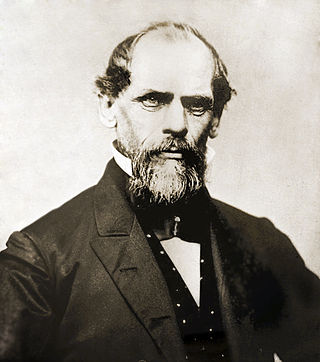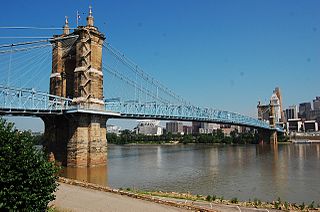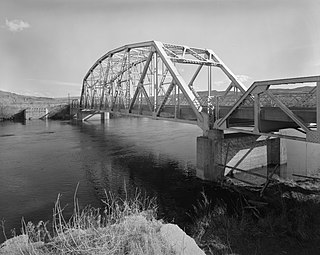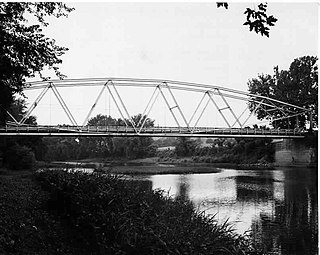
The Pine Grove Covered Bridge is a covered bridge that spans the East Branch of Octoraro Creek on the border between Lancaster County and Chester County in Pennsylvania, United States. It is the longest covered bridge in Lancaster County. The bridge was built in 1884 by Elias McMellen.

John Augustus Roebling was a German-born American civil engineer. He designed and built wire rope suspension bridges, in particular the Brooklyn Bridge, which has been designated as a National Historic Landmark and a National Historic Civil Engineering Landmark.

The John A. Roebling Suspension Bridge is a suspension bridge that spans the Ohio River between Cincinnati, Ohio, and Covington, Kentucky. When opened on December 1, 1866, it was the longest suspension bridge in the world at 1,057 feet (322 m) main span, which was later overtaken by John A. Roebling's most famous design of the 1883 Brooklyn Bridge at 1,595.5 feet (486.3 m). Pedestrians use the bridge to get between the hotels, bars, restaurants, and parking lots in Northern Kentucky. The bar and restaurant district at the foot of the bridge on the Kentucky side is known as Roebling Point.

The Bollman Truss Railroad Bridge across the Little Patuxent River at Savage, Maryland, is one of the oldest standing iron railroad bridges in the United States and the sole surviving example of a revolutionary design in the history of American bridge engineering. The 160-foot (48.8 m) double-span was built in 1852 at an unknown location on the main line of the Baltimore and Ohio Railroad. It was moved 35 years later to its present location, where it replaced the very first Bollman bridge. Today, it carries the Savage Mill Trail.

Old Blenheim Bridge was a wooden covered bridge that spanned Schoharie Creek in North Blenheim, New York, United States. With an open span of 210 feet (64 m), it had the second longest span of any surviving single-span covered bridge in the world. The 1862 Bridgeport Covered Bridge in Nevada County, California, currently undergoing repairs due to 1986 flooding is longer overall at 233 feet (71 m) but is argued to have a 208 feet (63 m) clear span. The bridge, opened in 1855, was also one of the oldest of its type in the United States. It was destroyed by flooding resulting from Tropical Storm Irene in 2011. Rebuilding of the bridge commenced in 2017 and was completed in 2018.

The Hares Hill Road Bridge is a single-span, wrought iron, bowstring-shaped lattice girder bridge. It was built in 1869 by Moseley Iron Bridge and Roof Company and is the only known surviving example of this kind. The bridge spans French Creek, a Pennsylvania Scenic River.

The Zion – Mount Carmel Highway is a 25-mile (40 km) long road in Washington and Kane counties in southern Utah, United States, that is listed on the National Register of Historic Places and is a National Historic Civil Engineering Landmark.

The CQA Four Mile Bridge spans the Big Horn River in Hot Springs County, Wyoming. The bridge was erected in 1927-28 by the Charles M. Smith Company and spans 175 feet (53 m) with a total length of 295 feet (90 m). The rigid 7-panel Pennsylvania through-truss was nominated for inclusion on the National Register of Historic Places as one of forty bridges throughout Wyoming that collectively illustrate steel truss construction, a technique of bridge design that has become obsolete since the mid-twentieth century. The bridge rests on concrete piers and abutments and is approached by two Warren pony trusses.

The Bridge in Nicholson Township is a historic lenticular truss bridge located in Nicholson Township, Wyoming County, Pennsylvania. It was built in 1876, and measures 110 feet (34 m) long. It spans Tunkhannock Creek.

The Yale Bridge or Lewis River Bridge spans the Lewis River near Yale, Washington. It was built in 1932 by Cowlitz and Clark counties. The suspension bridge has a clear span of 300 feet (91 m), with a total length of 532 feet (162 m), replacing a previous steel truss bridge at the site. Construction of the Ariel Dam had created Lake Merwin with a water depth of 90 feet (27 m) at the site, requiring a new bridge that did not need to have support piers in the water. The road deck, stiffened by a steel Warren truss, is 50 feet (15 m) above the high water line of the reservoir.

The Pine Brook Covered Bridge, also called the Wilder Covered Bridge, is a wooden covered bridge that crosses Pine Brook in Waitsfield, Vermont on North Road. Built in 1872, it is one two surviving 19th-century covered bridges in the town. It was listed on the National Register of Historic Places in 1974.

The Yosemite Valley Bridges are eight bridges in the Yosemite Valley of Yosemite National Park, most of them spanning the Merced River. Five of them were built in 1928, with the remainder built between 1921 and 1933. The bridges feature a concrete structure faced with local stone, in an elliptical or three-centred arch configuration. They are notable for their uniform character and for their conformance to tenets of the National Park Service rustic style. Design work for the seven newer bridges was by George D. Whittle of the San Francisco District Office of the U.S. Bureau of Public Roads for the National Park Service. Concrete bridges were chosen at the urging of Thomas Chalmers Vint of the Park Service, in lieu of alternative designs for steel truss bridges, or suspension bridges suggested by the park superintendent.

Bridge in Reed Township, originally known as Wiconisco Canal Aqueduct No. 3, is a historic multi-span stone arch bridge spanning Powell Creek on State Route 147 in Reed Township, Dauphin County, Pennsylvania. It was built in 1840, as an aqueduct. The property measures 72 feet (22 m) long by 50 feet (15 m) wide. It is built of red and white coursed ashlar and features a belt course and continuous parapet cap.

Bridge in Brown Township is a historic lattice truss bridge spanning Pine Creek at PA 414 in Brown Township, Lycoming County, Pennsylvania. It was built in 1890, by the Berlin Iron Bridge Co. of East Berlin, Connecticut. The bridge measures 227 feet (69 m) long and 19 feet (5.8 m) wide.

Bridge in Lewis Township was an historic Pratt through truss bridge spanning Lycoming Creek at Lewis Township, Lycoming County, Pennsylvania. It was built in 1890, and measures 171 feet long and 18 feet wide.

Bridge in Porter Township is a historic lenticular truss bridge spanning Pine Creek at Porter Township, Lycoming County, Pennsylvania. It was built in 1889, and is a single-span bridge that measures 287 feet (87 m) long and 20 feet (6.1 m) wide.

Corbin Bridge, also known as Huntingdon County Bridge No. 20, is a historic suspension bridge spanning the Raystown Branch Juniata River and located at Juniata Township, Huntingdon County, Pennsylvania. It was built by the Reading Steel Products Inc. in 1937. It measures 322-foot-long (98 m) and has a 12.5-foot-wide (3.8 m) deck. It is the only road suspension bridge in Huntingdon County.

Bridge in Washington Township, also known as Kralltown Road Bridge, was a double-intersection Pratt truss bridge spanning Bermudian Creek near Kralltown, Washington Township, York County, Pennsylvania. The bridge was built in 1884 by the Wrought Iron Bridge Company and measured 153 feet (47 m) in overall length.

The Pine Mill Bridge is an historic structure located in Wildcat Den State Park in rural Muscatine County, Iowa, United States. It was built in 1878 near the Pine Creek Gristmill, the only place in Iowa where a mill and bridge combination remains in place. The bridge was listed on the National Register of Historic Places in 1998 as a part of the Highway Bridges of Iowa MPS.

Best's Covered Bridge(akaSwallow's Bridge) is a historic covered bridge in West Windsor, Vermont, that carries Churchill Road over Mill Creek, just south of Vermont Route 44. Built in 1889, it is an architecturally distinctive laminated arch structure with a post-and-beam superstructure. It was listed on the National Register of Historic Places in 1973.























